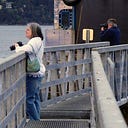Socks, Underwear, Power, and Water
— What RVing has taught me about conservation
Rvers are a great example of people who have had to learn how to conserve and how to be self-sustained. Something many in society should learn.
We are not by any means, experienced Boondockers (meaning drying camping and no hook-ups) but we do dabble in it from time to time. The most we seem to be able to handle is three days. Then it is time to find hook-ups and get back to our creature comforts.
We did five days once but we did have electricity and access to bathrooms and clean showers so we were able to conserve on water and not fill up our black and gray tanks. By then it was time to think about doing laundry or else run out of underwear and socks.
Don’t tell my husband, but I am so much better at conservation than he is, especially when it comes to water… the hardest thing for us to manage.
We don’t realize how much you rely on the basics, like water and electricity, until we don’t have it or have to limit its use.
Betty Jo (the Airstream) comes equipped with:
Fresh water tank — 39 gallons
Grey water tank — 37 gallons
Black water tank — 39 gallons
2 Air Conditioners
Ducted heat and cooling
2–30 lbs Propane Tanks
2-way, 7 cu ft Fridge (propane and electric)
180 watts of Solar Panels
2 — AGM Group 27 Lifeline Batteries, providing 200 amp hours of power
We also have a Champion 3400 generator, just in case.
When we are in a place with full hook-ups, life is somewhat normal and conservation isn’t as big of a concern. But that doesn’t mean we should be unprepared or take it for granted.
For example — we were at a nice park in Amarillo, Texas and got hit with a spring blizzard of snow and 65 mph winds. It knocked out power in the park in the middle of the night, including water. Our batteries took over and kept the heat going. During the day, since there was not much sunlight for our solar panels, we finally had to break out the generator to provide power.
Since we knew the weather was going to be cold that night we had unhooked from city water and had about 25% in our fresh water tank. The RV park’s water source was powered by a pump which went out when the power went out, this meant their restrooms didn’t work. We had to conserve water usage, not knowing how long it would last.
Luckily, the power kicked back on in less than 24 hours and the next day the sun came out and the snow was like it was never there. But it was a lesson to be learned — be prepared.
When we do Boondock, we fill up our fresh water tank, empty our grey water tank, and start our black tank at about 15%. We fill up water bottles with filtered water and use that for drinking water and brushing our teeth. At night, after the sun goes down, we limit our power usage to just a couple of small lights and only run the furnace (if needed) in the middle of the night, keeping it around 58 degrees.
We have a Victron Bluetooth 712 battery monitoring system with the app on the iPhone so we can monitor our batteries. During the day, once the sun comes back up and powers our batteries through the solar panels, we will turn on the inverter and power our devices, if need be. We do not have enough power to run items like the air conditioners, the microwave, or the television while boondocking.
We also limit showers and take Navy showers to limit water usage.
We explored more of the off-the-grid life these past few months, spending a couple of days or more in a variety of places.
When we do go off grid, it changes the way RVing feels — it has a sense of freedom. You become more conscious of conservation, of your surroundings, and even yourself.
It has a relaxing sentiment to it. I can understand why some people are attracted to this type of life. The remoteness, the emergence into nature, and the disconnect to all of the things that hold us hostage in the city — it gives us a deeper appreciation for life.
After a while though, the city girl in me craves the comforts of being hooked up and connected. The need for clean socks and underwear become more necessary. And a nice hot shower is heaven.
What have I learned?
I have always been a little conscious about conservation and protecting our precious resources, but practicing conservation wasn’t really a high priority — that is until it became a direct part of my little world. I didn’t realize how much I took these things for granted until I had to rely on me to conserve. I have learned to appreciate and be grateful for what we do have. I have learned the importance of these precious commodities and how all of us should be more conscious and understanding of what they mean and how to protect them.
I have also learned that I actually enjoy living off the grid — sometimes.
